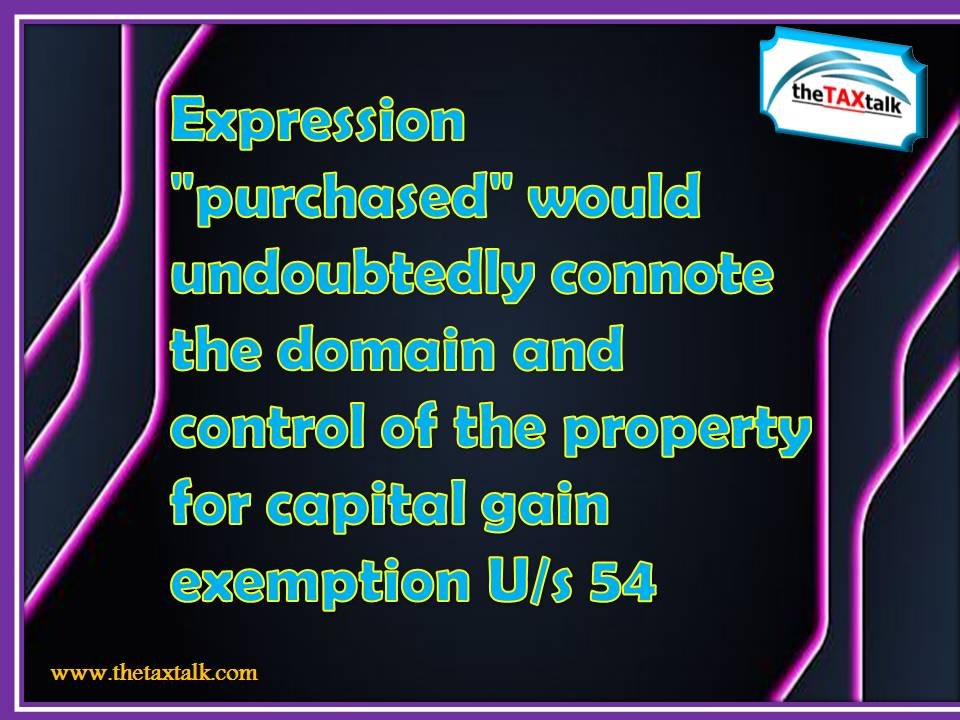![]()
Expression “purchased” would undoubtedly connote the domain and control of the property for capital gain exemption U/s 54
AP high court has held that the expression “purchased” would undoubtedly connote the domain and control of the property for capital gain exemption U/s 54
Let us read the landmark order which is relevant for all the taxpayers:
Andhra High Court
Commissioner Of Income-Tax vs Shahzada Begum on 21 March, 1988
Equivalent citations: 1988 173 ITR 397 AP
Author: Y Anjaneyulu
Bench: G R Naidu, Y Anjaneyulu
JUDGMENT Y.V. Anjaneyulu, J.
- The Income-tax Appellate Tribunal made this reference under section 256(1) of the Income-tax Act, 1961, in connection with the assessment year 1976-77. The question referred for the consideration of this court is :
- “Whether, on the facts and in the circumstances of the case, the Income-tax Appellate Tribunal is correct in law in holding that the assessee is eligible for exemption under section 54(1) of the Income-tax Act ?”
- The assessee was the owner of a small house property, admittedly under her self-occupation. She sold this for a consideration of Rs. 38,750 on August 12, 1975. The original cost of the above property was Rs. 15,000 (purchased on December 30, 1969). The assessee claimed that the house property sold was under her self-occupation and that she utilised the proceeds of the house sold for acquiring another house for her self-occupation and, consequently, the capital gain arising on the sale of the residential house was not liable to be taxed under section 54(1) of the Act. The assessee pointed out that The entered into an agreement for the purchase of another property for a consideration of Rs. 47,000 and that that agreement was dated June 27, 1976. At the time of the agreement, the assessee paid a substantial sum of Rs. 29,000 through cheque. The stipulation in the agreement was that a further sum of Rs. 11,000 would be paid soon and the balance of Rs. 7,000 would be paid on delivery of possession. From the facts on record, it would appear that the vacant possession of the house property was delivered on August 10,1976, on which date the amount of Rs. 11,000 was paid. In other words, a sum of Rs. 40,000, out of Rs. 47,000, was paid out of the sale consideration by August 10, 1976. It, however, transpired that the sale deed was registered only on August 22, 1977. The Income-tax Officer held that the crucial date for the purpose of determining when the property was purchased was the date of registration of the sale deed in favour of the assessee. and inasmuch as the date of the sale deed fell outside the period of one year from the date of sale of the property earlier, the assessee was not entitled to claim exemption under section 54(1) of the Act. The above view was upheld on appeal by the Appellate Assistant Commissioner but was reversed by the Tribunal on second appeal. The Tribunal held that, on the facts and circumstances, the question is as to when the assessee “purchased” the property. The Tribunal felt that the matter need not be decided on the basis as to when the property was sold in favour of the assessee. The expression “purchased” would undoubtedly connote the domain and control of the property given into the assessee’s hands. From the facts on record, it is clear that, apart from the payment of substantial purchase consideration, the assessee secured possession of the property on August 10, 1976, which is within the period of one year specified under section 54(1) of the Act. There might have been some procedural delay in obtaining formal registration of the sale deed. But, that, in our opinion, is immaterial. In the facts and circumstances, the Tribunal was right in coming to the conclusion that the assessee purchased another residential house within the period of one year as stipulated under section 54(1) of the Act. The house property purchased by the assessee had come into the full domain and control of the assessee within the period of one year.
- In the circumstances, our answer to the question referred is in the affirmative, i.e., in favour of the assessee and against the Revenue. No costs.

